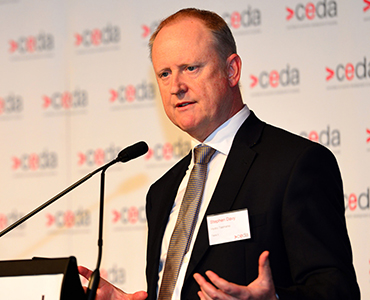PROGRESS 2050: Toward a prosperous future for all Australians
21/05/2017

“We have to be able to demonstrate that there is a great positive future out there,” he said.
“That we’ve got plans in business to make that positive future come along and not just talk about it in abstract ways but to tell those positive stories of how that future is being delivered to people right now.”
Mr Davy spoke about Hydro Tasmania’s ineffective communication to the Tasmanian public during the Basslink outage in December 2015.
“Leading internally during that period was very straight forward,” he said.
“It was a very clear short term problem, the link was out, it hadn’t rained, we needed to do something physically to fix the problem.
“The whole state was looking at us, they didn’t want the lights to go out understandably and the economy more importantly needed to maintain confidence.”
Mr Davy said Hydro Tasmania got through the situation in terms of meeting the physical challenge.
“We did a great job of recruiting our internal resources to face the challenge, we got the departments within government, the other government-owned companies to work with us, it was very much a whole of state approach,” he said.
“Where we really missed was that we didn’t take the public of Tasmania with us nearly as well as we could’ve done.
“We were unprepared I think, for the level of public concern and particularly the level of business concern about how bad things could’ve got.
“We put a lot of effort into communicating but it wasn’t effective and what we have learnt since is how much more diligent we need to be in understanding how we’ve got to engage with stakeholders.”
Mr Davy said the main issue was misidentifying Tasmanians as stakeholders rather than important customers.
“We don’t have a direct customer relationship with Tasmanian consumers, except for the very largest, so we’d made the mistake of thinking that it was someone else’s issue to explain things to Tasmanian consumers,” he said.
“We had to explain to Tasmanian consumers ourselves what was going on and we’re going to have to do that into the future as well.
“We need to stop relying on the media and the government or other agencies in Tasmania to deal with that communication task and start doing it ourselves – being more visible as a company.”
Mr Davy said there are three key leadership themes to have during such a time.
“Have a plan, be explaining why things can be better in the future because of the plan and be telling stories of how that plan is succeeding.”
NAB Consumer Banking and Wealth Management Chief Customer Officer and MLC Non-Executive Director, Andrew Hagger said when people speak of leadership in Australia today, they tend to speak of its failure.
“We’ve seen around the world growing disillusionment with leaders because leaders globally have failed to present a clear plan for the future and to deliver the changes needed to show that all people can share in a prosperous life,” he said.
Mr Hagger said the federal government’s $6.2 billion bank levy came with zero consultation, no warning, no prior public discourse and it arrived in an unready state.
“I’m sure I’m not alone in saying a significant economic change should be explained, with a clear course of action set and a case made for it,” he said.
“That’s an appropriate mirror for significant economic change, don’t you think?”
Mr Hagger said NAB also needed to look into the mirror and face the stark fact that they were failing too.
“We have failed in our attempts to be right and true and fair 100 per cent of the time to 100 per cent of our customers,” he said.
“And for those we have failed, we have often taken too long to make it right for them and to help them get back on their feet.
“Getting it right and restoring trust and confidence is a major focus for us at NAB and for me, in fact the entire banking sector is making genuine efforts.
“We know we need to do better and NAB with the Australian Banking Association is implementing a number of reform initiatives.
“But you can go well beyond banking, into most big businesses today to see there is a big trust gap between customers and big business.”
Mr Hagger said there are three aspects of leadership most needed at this time.
“Number one, we need leadership by listening. This is not the sexiest form of leadership but it is surely the most effective,” he said.
“Secondly, we need leadership through collaboration and creativity.
“There’s no point big business and politicians having a race to the bottom on trust.
“Governments and big business need to roll their sleeves up and work together for Australians to solve the real problems that the nation has, to use creativity together to bring real reform and discover new solutions.
“Finally, leadership through integrity.
“Living up to our own mirrors, that’s what we need.”
